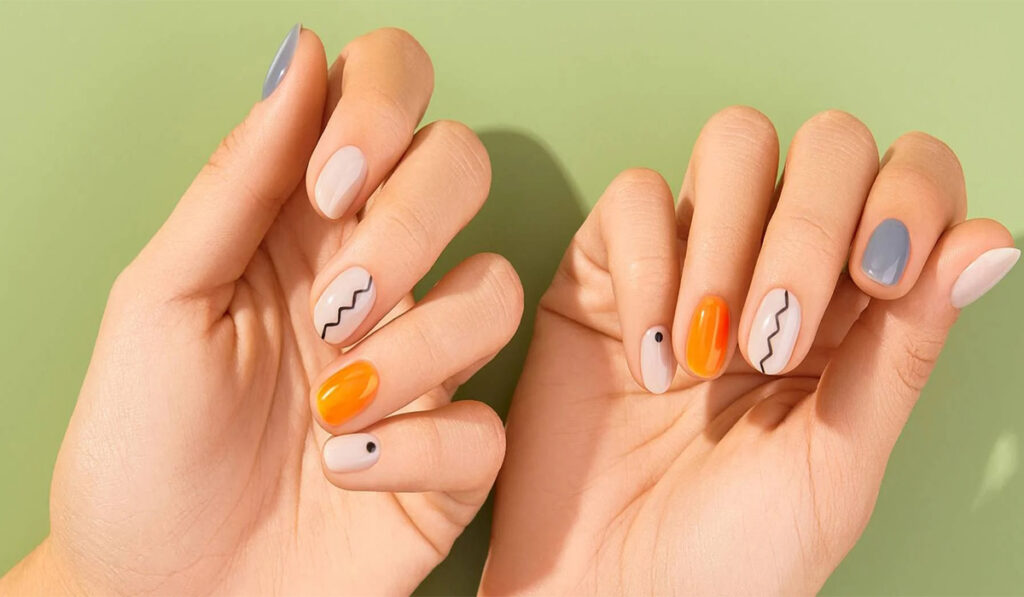
What is dip powder manicure? How to make and care for it at home
Forget about gel and acrylic nails and take your nail design to the next level with the dip powder manicure. It differs from a traditional manicure in that it lasts longer, looks extremely chic and protects brittle nails. In addition, the procedure is quite simple and in all respects better than a gel manicure. So before you rush to the next salon, scroll through this article to learn all about it and what to expect.

What is dip powder manicure?
You have just come out of the salon and you are satisfied with your perfectly manicured nails. You grab a soda can and try to open it only to chip your nail polish! Nothing compares to the regret one feels when something like this happens right after spending a lot of money on the perfect mani.
The dip powder manicure protects your nails from such unlikely accidents. It uses a colored powder and a resinous glue to give you a long-lasting manicure.
To give you a better idea of how the dip powder manicure is done, here is a brief explanation of the whole process:
The manicurist cleans the nail bed and prepares your nails for the manicure.
A transparent base is applied to your nails.
Immediately after applying the base, your nails are dipped in a small jar of colored powder.
After you take your nail out of the container, the nail technician will brush off the excess powder and seal it with a special resin-like glue (a special varnish).
The whole process is repeated several times on each nail.
The best thing about the dip powder manicure is that unlike other manicures, it doesn’t flake off. Also, no strong chemicals are used that could damage your nails. On the contrary, it strengthens your nails. Even dip powder does not hinder the nail extension. This is why the dip powder manicure has surpassed the popularity of gel nails. Check out the next section to find out why dip powder manicures are better than gel manicures.
Dip Powder Nails: Is It Better Than Gel Manicures?
While acrylic nails look artificial, gel manicures and dip powder manicures give your nails a more natural look. Both gel and dip powder manicures look similar, however, there is one major difference between them.
Although a gel manicure may have the same effect as a dip powder manicure, it also gives off a strong odor. Unlike gel manicure, dip powder manicure does not require curing time under a UV lamp to harden. It dries quickly by itself.
You don’t have to go to a nail salon for a dip powder manicure. How to remove dip powder nails at home? You can do this by following the instructions listed below.
How to get dip powder nails at home: step-by-step guide
Before you start your nail art, organize your equipment. Here are the things you need for the dip powder manicure at home:
nail polish remover
cuticle pusher
scrappers
nail buffer
Hand sanitizer or rubbing alcohol
Nail bonder or nail base coat
A dip powder manicure kit that includes
resin glue
colored powder
activator

1. Prepare your nails
Clean your nails with nail polish remover (if you wear nail polish) and push back cuticles with a cuticle pusher. If you have a scraper, use it to remove loose cuticles. Polish and file your nails.
2. Disinfect your nails
This is an important step in nail care. Use a nail sanitizer, rubbing alcohol, or an antiseptic spray to disinfect your nails. This prevents bacteria or dirt from getting stuck under the nail polish.
3. Coat your nails
Apply a coat of bonder (a clear substance) to your nails. Just leave it on for a minute.
4. Apply the resin
Slowly apply the transparent resin glue to your nails. Start in the area just above the cuticle and work your way towards the edge of the nail. Apply only one layer.
5. Apply the clear powder
Dip your finger in the powder container and roll it around for a few seconds. Remove your finger and tap gently to remove excess powder. Let it dry for a minute before removing the excess powder with a brush. Do not use colored powder at this time.
6. Apply more resin and colored powder
Apply another layer of resin to the nail and dip it in the color powder. Wait a few minutes before brushing off the excess powder. Repeat the step if you want a thicker manicure.
7. Apply the activator
Apply the activator to your nails the same way you would finish your regular nail polish with a coat of clear nail polish.

8. Apply the top coat
After applying the activator, apply a fresh top coat (use one that is suitable for acrylic nails). Let it dry completely.
Once the top coat has dried, wash your hands with warm water and soap/detergent.
How to care for manicured nails with Dip Powder
Do not apply the polish to your cuticles. This can lift your paintwork and make it more prone to chipping.
Dry your polish with cool air (preferably under a fan). If you use a dryer, set it on a cool setting.
Reapply the top coat after a few days to avoid damage.
Avoid using hand sanitizers as they can dry out your skin and damage the top layer of your manicure. Instead, wash your hands with detergent or soap.
If you are in the habit of biting your nails or scraping off your polish, try to avoid this as much as possible with the dip powder manicure as it can damage your nails.
Removing dip powder manicure is easy. Follow the steps listed in the next section to safely remove it.
How to remove dip powder in manicure
Use a nail polish to remove the glossy top coat. Do it thoroughly on each nail.
Soak a cotton ball in acetone (until it drips) and place it on the nail. Wrap a piece of aluminum foil around your finger to hold the cotton ball in place. Follow this step for each nail.
Leave the cotton balls soaked in acetone for 15 minutes.
Remove the cotton balls while pressing them against your nails and wiping away the remaining powder.
With proper use and care, the dip powder manicure can last up to a month. But is this manicure good for your nails? Or does it have any side effects? let’s find out
Disadvantages of the dip powder manicure
Do not worry. The dip powder manicure has no long-term side effects on your nails. However, with regular use, some temporary side effects may occur. These are:
Soaking your nails in the powdered paint bottle is unhygienic as it can become a breeding ground for bacteria and germs.
A dip powder manicure can damage the protective coating on your nails by drying them out. However, once you remove the polish, your nails will grow back.
If not removed properly, it can damage your nails.
Trimming the cuticles too low or pushing them in too far can lead to nail infections.
In summary, dip powder manicures offer a durable and chic alternative to traditional gel and acrylic nails. It involves dipping the nails in colored powder and sealing them with a special resin, resulting in a long-lasting and natural-looking manicure. Unlike gel manicure, dip powder manicure does not require UV curing, making it faster and more convenient.
You can also perform a dip powder manicure at home by following a step-by-step guide that includes cleaning, sanitizing, applying resin, color powder, activator, and top coat. To maintain the manicure, proper care is essential, e.g. B. avoiding contact with cuticles, using cool air to dry, and reapplying top coat regularly.
Removal uses acetone to dissolve the manicure, and with proper care, dipping powder manicures can last up to a month without causing long-term damage to nails.
However, it is important to be aware of possible temporary side effects such as: B. the risk of bacteria and germs building up in the powder container and the possibility of the nails drying out if they are not removed properly. Proper nail hygiene and care can help mitigate these risks and ensure a beautiful and long-lasting dip powder manicure experience.
